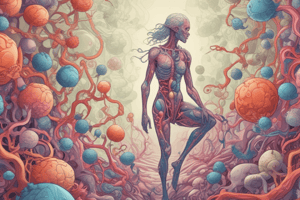Podcast
Questions and Answers
What is the function of the nucleus in a cell?
What is the function of the nucleus in a cell?
- Produce energy for the cell
- Control the movement of materials in and out of the cell
- Store genetic material (correct)
- Break down waste materials
Which structure is responsible for producing ribosomes in the nucleus?
Which structure is responsible for producing ribosomes in the nucleus?
- Nucleolus (correct)
- Chromatin
- Plasma membrane
- Nuclear membrane
What is the main function of the nuclear membrane?
What is the main function of the nuclear membrane?
- Act as a barrier for the nucleus (correct)
- Store genetic material
- Produce energy for the cell
- Control the movement of materials in and out of the cell
Which region of the cell contains the genetic material (DNA)?
Which region of the cell contains the genetic material (DNA)?
What are tissues made up of?
What are tissues made up of?
What are cells considered to be?
What are cells considered to be?
Where is chromatin located?
Where is chromatin located?
What is the function of microvilli?
What is the function of microvilli?
What is the main function of ribosomes?
What is the main function of ribosomes?
Where are free ribosomes found?
Where are free ribosomes found?
What is the main function of the smooth endoplasmic reticulum?
What is the main function of the smooth endoplasmic reticulum?
What is the main function of the Golgi apparatus?
What is the main function of the Golgi apparatus?
Where are lysosomes located?
Where are lysosomes located?
What is the main function of peroxisomes?
What is the main function of peroxisomes?
What is the main function of desmosomes?
What is the main function of desmosomes?
What do gap junctions do?
What do gap junctions do?
Flashcards are hidden until you start studying
Study Notes
Function of the Nucleus
- Acts as the control center of the cell, housing genetic material (DNA).
- Regulates gene expression and mediates the replication of DNA during the cell cycle.
Ribosome Production Structure
- The nucleolus is responsible for synthesizing and assembling ribosomes within the nucleus.
Nuclear Membrane Function
- Serves as a barrier that separates the nucleus from the cytoplasm, regulating the exchange of substances through nuclear pores.
Location of Genetic Material
- DNA is located within the nucleus, organized into chromatin and chromosomes.
Composition of Tissues
- Tissues are formed from groups of specialized cells that perform specific functions.
Classification of Cells
- Cells are considered the basic structural and functional units of life, capable of carrying out all necessary life processes.
Location of Chromatin
- Chromatin is found within the nucleus, playing a role in packaging DNA and regulating gene expression.
Function of Microvilli
- Microvilli increase the surface area of the cell, enhancing absorption and secretion by providing more space for cellular processes.
Main Function of Ribosomes
- Ribosomes are responsible for protein synthesis, translating messenger RNA (mRNA) into polypeptide chains.
Location of Free Ribosomes
- Free ribosomes are found floating in the cytoplasm, synthesizing proteins that function within the cell itself.
Function of Smooth Endoplasmic Reticulum (SER)
- The SER is involved in lipid synthesis, detoxification of harmful metabolic byproducts, and calcium ion storage.
Function of Golgi Apparatus
- The Golgi apparatus modifies, sorts, and packages proteins and lipids for secretion or delivery to other organelles.
Location of Lysosomes
- Lysosomes are primarily located in the cytoplasm, containing digestive enzymes that break down macromolecules and cellular waste.
Function of Peroxisomes
- Peroxisomes detoxify harmful substances, metabolize fatty acids, and generate hydrogen peroxide, which is then converted to water.
Function of Desmosomes
- Desmosomes anchor adjacent cells together, providing structural integrity to tissues and enabling communication between cells.
Role of Gap Junctions
- Gap junctions facilitate direct communication between neighboring cells, allowing ions and small molecules to pass through, aiding in coordinated cellular activity.
Studying That Suits You
Use AI to generate personalized quizzes and flashcards to suit your learning preferences.




